#flamens
Explore tagged Tumblr posts
Note
"i'm hungover, kira. make it quick." even her own words make her head throb in protest. one would begin to think that maybe, just maybe, that old granny was lying about this tea being a hangover cure. she will remember that the next time foxes get to her chickens. "please." (yumiko duh hehe)

the wandering ronin has a raven following them, an omen in itself when asked by anyone well acquainted with the bird so often affiliated with the macabre. this one in particular was quite the troublesome corvid to be plagued with. still, today she does not come empty handed as she came to sit atop the edge of the table, presenting herself to yumiko with a smile and a proposition.
❛ ' please '? oh, darling, your head must be killing you. ❜ mirth leaks from her voice as she drawls. the witch's fingers push away the tea from yumiko, allowing it to slide to the other end of the table, while her other hand fishes out a small, glass potion bottle from the pocket of her cloak. the liquid inside was a pale lavender, string coiled around the cork and a small paper with a heart drawn on it labelling the poultice. ❛ a hangover cure from yours truly. mind you, it tastes like eating a sprig of lavender, but it works like a charm. ❜

after all, approaching a dangerous blade while the wielder was hungover was never a situation to be approached with if one did not have a peace offering ready. her smile widens, ❛ i came to see if you wanted to swing a sword for some gold. there's a bounty i found that would be much more fun with someone at my side. ❜ whether that meant company or a target ... well, she does not say.
@flamens
#flamens#SALEEEEEEEEEM#listen this got me so excited#i can't believe we're writing again after 18973489 years 🥺#YUMIKOOOOO MY MOST BELOVED#[ 𝐢. ] answered › i spoke destruction into the world and i could not take it back.#[ 𝐢𝐢. ] in character › i’ve no more kept my warmth than blood upon the snow.#[ 𝐯𝐞𝐫𝐬𝐞 ] main : present arc › the witch of chaos and calamity incarnate.
1 note
·
View note
Text


Don Flamenco lore is crazy bro
(Image taken from reddit)
#mike tysons punch out#punch out#don flamenco#punch out glass joe#glass joe#merchandise#BRO WHO IS LINDA#IM CRYING BRO WHOS LINDA#😭💀#Don Flamenco more like Don Flamen-hoe
80 notes
·
View notes
Text




When she asked him if he believed in fate, Charles Newmark unexpectedly smiled. The scars on his cheeks pulled tight, becoming even uglier than before. But there was something in his eyes — something she couldn’t quite place, something melancholy, achingly sorrowful. Those were the eyes of a man who’d lost everything once and had never come to terms with it.
“No,” he said, unusually quiet. “That would be Master Roland — the fatalist. Me? I’m sure everything that’s happened in my life was the work of human hands, or hands that were… not quite human. All of it,” he picked up a card from the table, holding it between his index and middle fingers, “is a lie. But a sweet lie. For those who long to be deceived.”
Cyberpunk 2077: Fright Night City 2024
› Day 5//Fortune Teller
With @drunkchasind's Jessa 🖤❤️
For the @fright-night-city event
#cyberpunk 2077#photomode#writing#gothic#dark fantasy#halloween#dailygaming#oc: jessamyn murphy#oc: the black head#kdval OCs#cp2077 kdval#virtual photography#fright night city 2024#look the sad boi can smile sometimes!#don't trust your fate with these two#the witch and the flamen#don't ask me how many props I spawned... tons of them#tons
59 notes
·
View notes
Text

#till lindemann#rammstein#ot6 content#WOLLT IHR DAS FRIDGE IN FLAMEN SEHEN?#fridge man plays with fire
17 notes
·
View notes
Text
Ooh, it’s been a while since I’ve practiced any swing dancing!
*one severe leg injury later, coughing up blood*
I’ve still not swung my last swing
3 notes
·
View notes
Text

Fanservice for abandoning y'alls lol
#zhask#zhaskposting#mlbb#ml#mobile legends#mobile legends bang bang#zhask mlbb#mlbb zhask#fanart#bone flamen#artists on tumblr
4 notes
·
View notes
Text
#screeching#he’s one of my least favorites like WHAT ARE YOU DOING#only Greek deity I work with is Nyx#main matron is Hel tho#Loki is there too but he’s a package deal with his kids in my experience#jk I love him he’s fun#Deer god is also fun#he’s the main patron#anyways#pls no Zeus lol
oh no i'm sorry. I TAKE IT BACK
here's a random word generator--whatever word it gives you is now the thing you are the deity of
299K notes
·
View notes
Text
mein neuer traumjob: kommentator
dann könnt ich die ganze zeit nur scheiße labern und würd dafür bezahlt werden
0 notes
Text

0 notes
Text
Relish
There's something fun about watching the latest run of Likes and Reblogs, when a kid calls you a normie-chuuni for not using L337-SP33K.
Look - being verbose is fun. Putting words together, constructing entire sentences, even veering into deliberate bloviating, going back and forth between heartfelt stuff and raw shitposts - I love this shit. There is something to having multiple lexicons and language levels to draw on, that feels flexible and powerful. In the meantime, you've got adults that act like they're not ten years past their teens that feel pressured into using what's effectively inefficient cant because they've constructed this weird fucking idea that replacing one letter with a number has any kind of real, concrete use.
The usual idea is to somehow circumvent porn or language filters, but the thing is, Tumblr only flags visual content. I could write full-bore erotica on here that it wouldn't actually be flagged as adult. I can swear like a sailor, I can use words that other platforms frown on inexplicably - and the best part is Tumblr actually has a community of readers. People can write video transcripts, reviews, essays and other longform content, and it will be read by a small percentile!
There is zero need for compression. The only reason to be concise on here is out of basic fucking decency towards your readers.
Plus -normie-chuuni? Seriously? Loved it. That's bottom-tier linguistic construction, Cringe in raw drinkable form.

If being a normie gets me a salary and budget enough to upgrade my rig every four years, fuck man, guilty as fucking charged.
1 note
·
View note
Video
"Gabigol quebra o silêncio: Desabafo explosivo sobre as 'briguinhas no F...
#youtube#flamengocopa do brasilnoticias do flamengocopa do brasil 2022shiek flamengoflamengo ao vivode sola flamengonoticias do palmeirastreta flamen
0 notes
Text
'I am no king, but Caesar'

Gaius Julius Caesar was born on July 12, 100 BC in the Suburra, a populous neighborhood of Rome, to a patrician family although in economic decline. In Gens Iulia, those who had the surname Caesar descended, according to the account of Pliny the Elder, from a man who was born after a Caesarean section (from the Latin verb "to cut", caedo, -ĕre, caesus sum). He was born in a Republic in crisis and the aristocracy divided into two warring factions: The optimates and populares. He lost his father when he was about 14 years old; he was greatly influenced by his maternal uncle Gaius Marius. Caesar had an older sister, Julia Major, and a younger sister Julia Minor (maternal grandmother of Emperor Augustus). His uncle, Gaius Marius, was the leader of the Populares ("supporters of the people") and rival of Lucius Cornelius Sulla, leader of the Optimates ( "best ones")

In 84 BC Lucius Cornelius Cinna, an ally of Gaius Marius, chose the 16 year old Caesar to be flamen Dialis (priest of Jupiter) and married him to his 13 year old daughter Cornelia with whom Caesar had a daughter named Julia. It is not certain whether the girl was born a few months before or after the teen Caesar had fled Rome or, more likely according to historians, she was born when he returned years later and was reunited with his wife.
Following the suicide of Gaius Marius in 86 BC, Cinna, one of the leaders of the Populares, became sole ruler of Rome and most of the provinces while persecuting Sulla's followers. In 84 Cinna was assassinated and populares defeated.
Due of his ties to the Cinna family, Sulla attempted to force Caesar to divorce Cornelia if he wanted to live in peace, but Caesar refused. Sulla confiscated his property, and he was forced to leave Rome. Populares supporters and Caesar's own mother pressured Sulla to allow him to return, claiming that he was not dangerous as he was just an adolescent. Sulla refused and said "I see several Marius in him" referring to his archrival Gaius Marius, Caesar's uncle.
Shortly afterwards, although he was allowed to return to Rome, Caesar decided to head to Asia to participate in the war against Mithridates VI of Pontus. There he distinguished himself in the capture of Mytilene. He then headed to Bithynia, a kingdom allied to Rome, where he spent some time.

In addition to being a politician and a soldier, Julius Caesar was a writer. Among others, his works were a treatise on astronomy, another on Roman religion, a study on Latin and his comments on the war in Gaul and the Civil War; only his writings on those two wars have not been lost.
In the year 78 after Sulla's death from natural causes, Caesar decided finally to return to Rome. He was reunited with his wife Cornelia, who had waited patiently for him. Nine years later, Cornelia- the only woman he truly loved, according to all accounts- died at the age of 28. Caesar went into deep mourning and gave a solemn speech.

After serving as quaestor in the Hispania Ulterior province where he increased his network of clients - patronage was key to success in Roman politics - Caesar returned to Rome in 69 BC where he served as Aedile; he carried out building programs and offered the largest gladiatorial games seen until then. This left him almost bankrupt. In 60 BC he decided to make a private agreement with the prestigious general Pompey the Great and one of the richest man, Marcus Licinius Crassus. Pompey had just put an end to the pirate problem and years earlier, together with Crassus, he had defeated the slave rebellion led by Spartacus.
Pompey and Crassus were hampered in many of their ambitions by the Optimates in the Senate. Caesar, knowing this, approached them to put together an unofficial coalition - known to history as the Triumvirate - if they made him Consul, he would see to it that laws were passed that would benefit them. To further consolidate this alliance, in the year 59 BC Caesar married Pompey to Julia. Although this was a typical political marriage, classical sources state that Julia truly loved Pompey and he loved her.
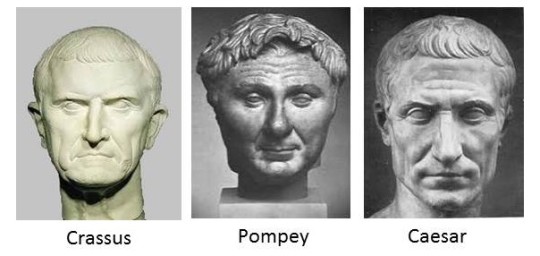
Pompey and Crassus decided to ally themselves with Caesar and the populares in order to gain more offices and wealth. In this way, the three took full control of Rome. In 59 Caesar was appointed consul.
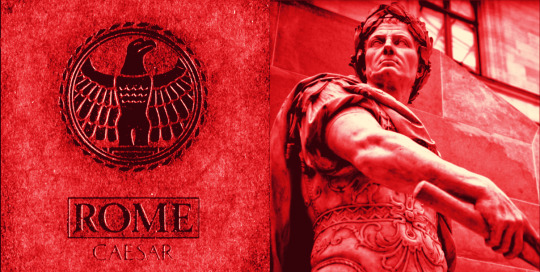
Laws were passed granting the province of Syria to Crassus. Laws were passed distributing lands among Pompey's veterans. And at his own request, the Gallic provinces-both the pacified and the "wild" ones- were handed over to Caesar. Cicero, a true defender of the Republic, was exiled due his bold speeches against the Triumvirate, which he called a "three-headed monster" but was allowed to return the following year. The passage of the laws favoring the triumvirs was ensured by introducing veteran legionaries of Pompey into the meetings of the Senate.
Also in 59 BC Caesar established a military camp in the Arno valley, on the Via Cassi, the main communication route between Rome and the north of the country. He called the camp Florentia, which means "flowering." The camp quickly became an important commercial town. Today it is the beautiful Italian city Florence.

In Gaul with his legions, he defeated and subdued several peoples in just a few years. Caesar wrote in detail about this conquest in his Bellum Gallicum (Gallic War). Believing that everything was under control, he headed to the mysterious land that the Romans called Britannia and where they believed the world ended. The Gallic War was between 58-52 BC

Caesar finally arrived in Britain for the first time in the summer of 55 landing with two legions. The following year he arrived with 800 ships, five legions and 2,000 cavalry. Caesar's comments on this war constitute the first written descriptions of the people, culture and geography of the island.

Although Caesar not conquered Britania (it was conquered under the Emperor Claudius) this campaign it established Rome's first allied peoples in Britain.
While in Britania, Caesar received the news that his daughter and the baby she was expecting had died in childbirth.
At the same time he had no idea that a genuine leader named Vercingetorix, of the Arverni tribe, had managed to unite all the Gallic peoples under his authority, determined to expel the Romans

Caesar himself called him "King of all the Gauls"
The most famous and final battle was that of Alesia. Although Vercingetorix was a great warrior, he could do nothing against the genius (sometimes bordering on madness) of Caesar and his legionaries. According to Caesar, Vercingetorix, seeing that if he continued he would starve his entire people to death due to the siege, rode towards the Roman camp, dismounted, took off his sword and sat on the ground without saying a word. He decided to surrender in exchange for his people living. And so it happened, Vercingetorix was taken prisoner but his men were not executed. But Caesar had to wait years for his triumph -and Vercingetorix had to wait as a prisoner in Rome, before his execution- because while Caesar was fighting against the Gauls, many Roman senators were plotting his downfall.

Everything Caesar wrote about his battles and conquests, written in the third person, was copied and sent to be read publicly in Rome, which was celebrated by the plebs and Caesar 's supporters. True republicans such as Cato, Cicero, Cassius, and Brutus perceived a real danger to the Republic. The Triumvir Crassus was killed by Parthians in his failed attempt to conquer Parthia: The triumvirate was over and Pompey, who had become Sole Consul saw in Caesar a dangerous rival, and allied himself with the Optimates again.
They created a new law: the office of consul or proconsul could no longer be held in absentia, as well as running for those offices outside of Rome. Thus, Caesar, far from Rome, lost the protection of the law that granted him his magistracy—just as today, the President of a nation cannot be prosecuted while in office—and could no longer run for election as consul or proconsul. Clearly, the idea was to put him on trial and send him, hopefully, into exile, since thanks to this law, he instantly became an ordinary citizen.
Upon receiving this news, Caesar was enraged and decided to return to Rome not as a citizen, but as a general commanding his legionaries, who followed him devotedly. He would later say, "I never wanted this war, but my adversaries have eagerly sought it."
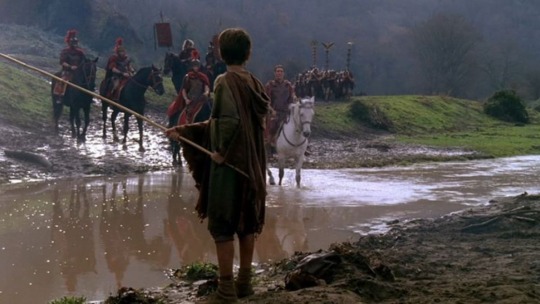
No legion was to reach Rome by crossing the Rubicon River; such an action meant civil war.. Caesar crossed the Rubicon with his XIII legion and proclaimed a very popular phrase in Ancient Rome that players always said before throwing the dice: "Alea Iacta Est" (the die is cast). This is known thanks to Roman historians who took as a source the writings of Gaius Asinius Pollio, who was close to Caesar and could have heard him. This saying became legendary even for the ancient Romans due to the surprising idea of using this phrase from a game in the context of a war.
Pompey and his legionaries left Rome and prepared for the war in Greece. In September of 48 Pompey was defeated at the Battle of Pharsalus. But he did not give up and headed to Egypt to seek the support of the young king Ptolemy XIII. Egypt was then a vassal kingdom of Rome due to its years of indebtedness, and the creditor was precisely Pompey, who had lent huge sums to Ptolemy XII. But as soon as he landed in Egypt, he was met by a group of men who, in the name of the young king, beheaded him and took his ring.
Fun fact: Among those who fought alongside Pompey against Caesar was the centurion Titus Flavius Petro, who after the defeat at Pharsalus was pardoned by Caesar and returned home; he was the grandfather of Titus Flavius Vespasian, the emperor who replaced the Julio-Claudian dynasty with his own Flavian dynasty in 69 AD.
While Cato the Younger and his men went to the province of Africa to continue the resistance, and Pompey's sons did the same in Hispania. Caesar went looking for Pompey to try to come to an agreement.
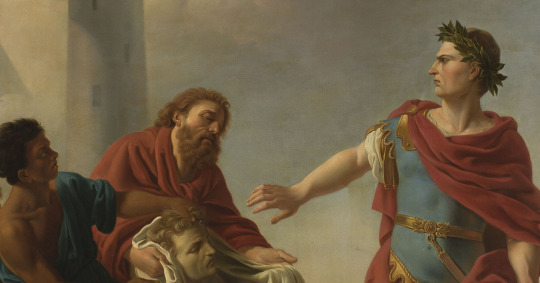
'Julius Caesar’s Dismay Upon Seeing The Head Of Pompey' (detail) By Louis-Jean-François Lagrenée (18th century)
King Ptolemy XIII, who was engaged in his own war with his sister Cleopatra for the throne, thought that by killing Pompey and giving his head and ring as a gift he would earn Caesar's gratitude and thus his kingdom would settle the unpayable debt it owed Rome. But Caesar was enraged by the undignified manner in which a Roman general and consul had been murdered and decided to side with Cleopatra and her allies.
The meeting between Cleopatra VII and Caesar at night and she entered hidden inside a huge rolled-up carpet carried by his slaves. Cleopatra was one of the many lovers that he had, they lived together and had a son, nicknamed Caesarion (little Caesar) whom he recognized but not legally. While Republican forces continued to resist, Caesar was immersed in the war between Ptolemy XIII, Cleopatra and the other sister, Arsinoe IV. Caesar's troops, together with those of Cleopatra plus Caesar's allies such as Mithridates of Pergamon and his army and a Jewish armed force led by Antipater finally won that war in January 47 and Cleopatra kept the throne of Egypt.
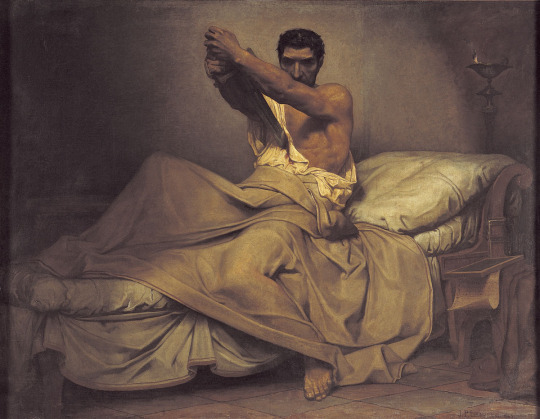
The Death of Cato of Utica, By Jean-Paul Laurens.
In early 46 BC, Caesar defeated the army of Cato the Younger, also known as Cato of Utica . Cato did not take part in the battle and being in Utica, Africa, after receiving the news that Caesar had won and pardoned his adversaries, decided to take his own life at the age of 49. Cato had a republican soul but was stubborn man, and was convinced that Caesar wanted to be king. He was the half-brother of Brutus's mother, Servilla (Caesar's long-time lover).
It was in this same year that Caesar, with the advice of the astronomer Sosigenes of Alexandria, reformed the calendar, leaving each month with the same number of days as it has today and creating the leap year.
The final battle of Munda, in Hispania, was on March 17, 45 BC, thus ending the civil war. Caesar returned to Rome and an intimidated Senate legitimized his victory by appointing him dictator for a ten-year term.
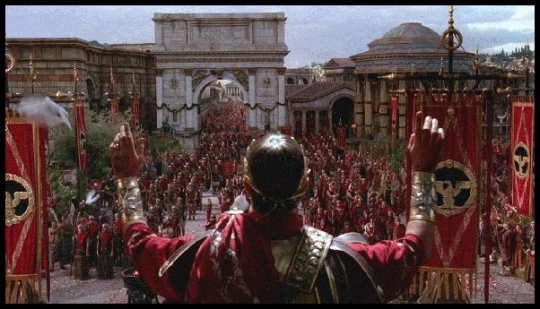
The position of Dictator was created by the Republic itself; he was a magistrate, elected by the Senate, with absolute powers to resolve military emergencies or exceptional tasks for a period of six months. He had to leave after that period or before if he managed to resolve the problem. This 10-year dictatorship was unprecedented.
In February 44 BC, Caesar succeeded in having the people of Rome proclaim him dictator for life. Cicero resigned from political life in protest.
Cassius persuaded Brutus that the only way to save the Republic was to kill Caesar. They needed Brutus to lead the conspiracy because of his prestige; he was not only Cato's nephew but also the direct descendant of the Republic's founding father.
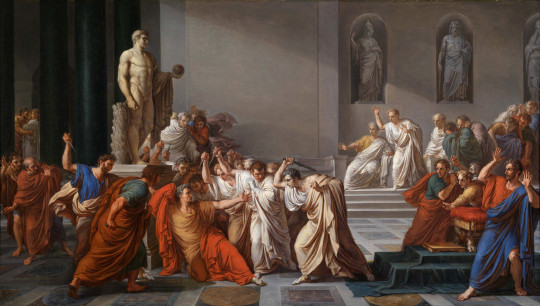
The Death of Caesar. By Vincenzo Camuccini (1805)
On 15 March 44 BC the group of conspirators intercepted Caesar just as he was passing the Theatre of Pompey, where the Roman Curia was meeting, and led him into a room off the portico. Lucius Tillius Cimber, under the pretext of presenting a petition, grabbed Caesar's toga with both hands and pulled him so tha Publius Servilius Casca could stab him, causing Caesar to exclaim "Ista quidem vis est?" ("What kind of violence is this?") Casca, drawing a dagger, slashed him across the neck. "What are you doing, Casca, you villain?" were perhaps his last words.
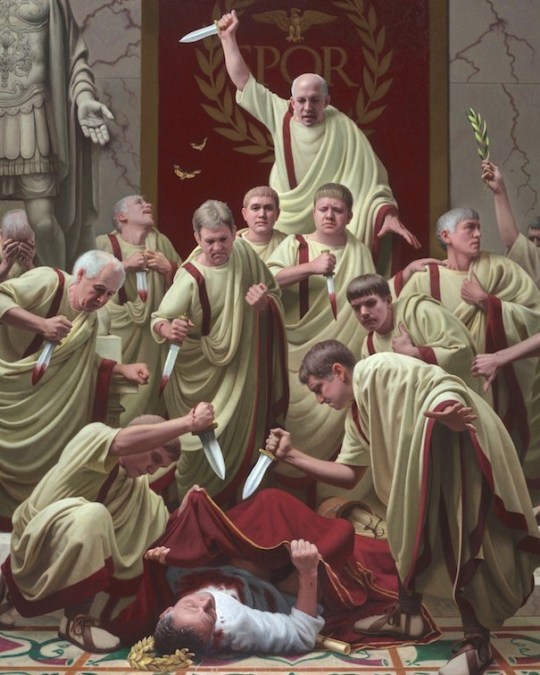
According to classical sources, he tried to flee but slipped on his own blood. A Roman coroner stated that "Caesar's body had several cuts, and 23 stab wounds but only one of them, in the chest, was fatal." They also claim that as he lay dying he took his toga and covered his face so that no one would see him die. He was 55 years old.

Mark Antony with other colleagues carefully collected the body and carried it before the people. Then he made a memorable speech.
The month then called Quintilis, the month of Caesar's birth, was renamed Iulius (July) in his honour on the initiative of Mark Antony. Julius Caesar was the last dictator of Rome; the office was abolished after his death.
Caesar named his grandnephew Gaius Octavius Thurinus as sole heir and adopted son, taking the name Gaius Julius Caesar Octavianus. As was customary in this type of adoption, he had the name of his maternal relative and since then he legally belonged to the family clan, in this case the Julii, adding to his new name the original paternal lineage: Octavianus ( "of the Octavii").
A good example to understand this is the father of Empress Livia, who was born with the name Appius Claudius Pulcher and who, upon being adopted by his maternal uncle Marcus Livius Drusus, changed his name to Marcus Livius Drusus Claudianus.
But nowhere in Caesar will did he say that his nephew should be his successor in office. It was very common among Roman aristocrats without sons to adopt a nephew, son of a sister or niece, or a grandson through a daughter if the father had already died, to continue the surname or clan name (nomen gentile).
If he legally recognized Caesarion, the boy would become a Roman citizen, and it would be a serious problem if the king of Egypt were Roman, as he could claim a throne in Rome. This shows that Caesar did not intend to establish a monarchy and was genuinely concerned about his fatherland.
Octavius certainly benefited from the adoption, but he became the Emperor of Rome thanks to his iron will, extraordinary cunning and political skill.
After his death, Caesar was proclaimed Divus Iulius, or the Divine Julius. He was the first Roman ruler to be deified.
After the end of the Julio-Claudian Dynasty, the cognomen CAESAR would become a Title of the Imperial Power, even many centuries later translated into other languages, such as the German Kaiser or the Russian Tsar.

In front of the theatre, an altar was erected where the pyre was placed so that Julius Caesar's body could be cremated in great mourning. Part of this altar is still preserved in the ruins; more than two thousand years after the assassination, every 15th of March, people come to leave flowers there.

Photo by Giovanni Dall'Orto, taken on March 15, 2008 Attribution, via Wikimedia Commons
190 notes
·
View notes
Text




“Venus, thy eternal sway All the race of men obey. Euripides, Iphigenia in Aulis. He is not a lover who does not love for ever.” — Euripides
Goddess Venus Talon Abraxas
Venus: Eroticized Goddess of Love
Origins of Venus Amongst Rome’s Latin Neighbors
The name “Venus” is speculated to be related to the Sanskrit word vanas, which translates to mean “loveliness”, “longing”, or “desire”. More directly, the name of this goddess is derived from the Latin noun venus, meaning “love”. This noun indicated specifically erotic love or desire. This goddess’ name is also directly related to the Latin verb venerari, meaning “to love or revere”, and possibly to the noun venenum, meaning “poison”, “charm”, “potion”, or even “aphrodisiac”.
Venus may be considered as part of a tradition of eroticized female deities, which was prevalent in both ancient Indo-European, and Near Eastern cultures. Apart from the Greek goddess Aphrodite, whom Venus eventually became equated with, other deities belonging to this tradition include the Egyptian Hathor, the Sumerian Inanna, the Mesopotamian Ishtar, and the Etruscan Turan. Like these other goddesses, Venus is represented as an extremely attractive female whose domains included love, sexuality, and fertility.
Originally, Venus was not part of the Roman pantheon, as indicated by Marcus Terentius Varro, an ancient Roman scholar who lived between the 2nd and 1st centuries BC. Varro mentioned that he could not find any mention of this goddess in the old records. This is supported by the fact that in the oldest Roman calendar, Venus had neither any special festival dedicated to her, nor a flamen (a priest who served a particular deity). Nevertheless, Venus was already worshipped amongst the Romans’ Latin neighbors. Amongst the Latins, Venus was regarded as the goddess of cultivated fields and gardens.
It seems that Venus was already a very ancient goddess amongst the Latins, and that she had at least two temples dedicated to her, one in Lavinium, and the other in Ardea. It is thought that the cult of Venus was brought to Rome from the latter city. As Venus was already being worshipped amongst Rome’s Latin neighbors, it is perhaps not so surprising that the cult eventually made its way to Rome. On the other hand, it is unclear as to how Venus, originally associated with agriculture, became a major goddess in charge of love and beauty.
41 notes
·
View notes
Text
Mythology Olympics tournament round 1
Propaganda!

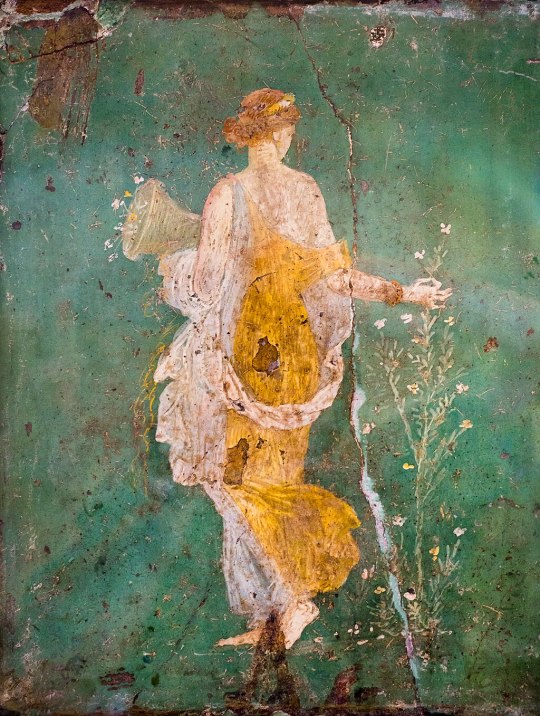
In ancient Egyptian mythology, Apophis was a malevolent deity or demon, often depicted as a giant serpent or snake. He was considered to be the embodiment of chaos, of destruction, and deep darkness. Ultimately, it was believed to be the primary enemy of the gods and the pharaoh. Since Apophis was seen as a constant threat to the order of the universe, his ultimate goal was to devour the sun god Ra and plunge the world into eternal darkness. He was often invoked in protective spells and incantations to ward off evil and ensure the continued prosperity of the kingdom.
Propaganda from the submitter:
He's just a lil' big worm boi
Flora is a Roman goddess of flowers and spring. She was one of the twelve deities of traditional Roman religion who had their own flamen, the Floralis, one of the flamines minores. Her association with spring gave her particular importance at the coming of springtime, as did her role as goddess of youth. She is one of several fertility goddesses and a relatively minor figure in Roman mythology. Her Greek counterpart is Chloris.
#Apophis#egyptian mythology#egyptian#egypt#ancient egypt#Flora#roman mythology#ancient rome#classical rome#roman#rome#tournament poll#polls#wikipedia#mythology#mythology tournament
27 notes
·
View notes
Text


Listen listen. I run two Hazbin Hotel RP blogs on Instagram. Bear with me when I say I've also been doodling more that I've been arting.








#km#kastiya#kastiya mas#oc#zhask#zhaskposting#bone flamen#spinneret seams#hazbin hotel oc#hazbin hotel#mlbb oc#mlbb
1 note
·
View note
Text
The Ides of March

By George Edward Robertson b. 1864 - Art UK - https://artuk.org/discover/artworks/mark-antonys-oration-over-the-body-of-caesar-56885
The old Roman months were divided into between 23-31 days, depending on the month and the year. Typically, the month began with a nonas (or nones), which was eight days, or nine days the way the Romans counted, the first one counting up to the nonas (days 1-7), the days leading up to the idus (or ides), then the final two counting up to the kalendas (or kalends), or first day of the month. The nundinae, between the first and second nonas, which were a type of weekend, were market days. Those market days had to be announced 3 weeks (between 17-24 days) before on the Idus of the month previous, or there would be no market day that month. The kalends was determined by the sighting of the first sliver of the moon after the new moon and the nonas happening on the day of the first quarter, and the ides on the full moon.
In 46 BCE, Julius Caesar reformed the calendar, ending the previous chaos of years that were between 355-378 days long. Ten days were added to the short 'regular' year with an extra day added every four years, bringing the year to 365 days as of 45 BCE. He left intact the system of the pre-existing Roman months.

By Ángel M. Felicísimo from Mérida, España - Retrato de Julio César, Public Domain, https://commons.wikimedia.org/w/index.php?curid=91281949
Gaius Julius Caesar was born on 12 July 100 BCE to a patrician family, gens Julia, claiming descent from Venus by his ancestor Julus, the son of Aeneas, who founded Alba Longa in central Italy. Despite claims that have been made, it is exceedingly unlikely that he was born via Caesarian section because at that time in Italy, it would have caused the death of the mother and his mother lived for decades after his birth. At the time of his birth, Caesar's family wasn't very prominent in Roman politics.
In his youth, Caesar was appointed as flamen Dialis, or a high priest of Jupiter, which normally placed a taboo on having a political career. Such an appointment shows that his family did not expect much of him. He was married to the daughter of Lucius Cornelius Cinna, Cornelia. In 84 BCE, his father died suddenly. In 82 BCE, Caesar was ordered to abdicate and divorce by Sulla, who'd won the civil war named after him. Caesar refused, thereby questioning Sulla's legitimacy. In retribution, Sulla might have put Caesar on the proscription list and Caesar went into hiding. They reached a compromise where Caesar would abdicate but keep his wife and 'chattels'.
He then traveled to Bithynia as a member of staff to the governor of Asia, where he eared the mocking epithet 'the Queen of Bithynia' for rumored relations with King Nicomedes IV. He served as part of the Siege of Mytilene, where he earned the civic crown, a military honor given to those who save the lives of their fellow citizens, and that ignited Caesar's hunger for more accolades. He returned home after the death of Sulla in 78 BCE. He attacked some of Sulla's cohorts, only semi-succeeding in one case against a less well connected senator, charging them with profiteering.
He left for Rhodes after failing to learn rhetoric with Apollonius Molon. It was on the trip there that he was kidnapped by pirates. Though legend says that his ransom was 50 talents and that he then executed the pirates, both are embellishments and the pirates were more likely enslaved.
In 73 BCE, Caesar was co-opted to take his dead relatives place in the pontifaces, the most illustrious college of priests. It marked him as well-accepted and having great future prospects for a political career. While he was on his way back to Rome, he was elected a military tribune, the rank between legate and centurion. No evidence currently exists that Caesar saw military action during his term of service, though he continued to agitate against any of Sulla's effects on the government.
He was sent to serve under Gaius Antistius Vetus for his quaestorship in 69 BCE, which also gave him a permanent seat on the Senate. Before he could leave, his aunt Julia died and shortly after his wife Cornilia died, leaving Caesar's only legitimate child, Julia as a new born. Caesar remarried to Sulla's granddaughter Pompeia.
Caesar spent the next period of his life supporting Pompey, including on the restoration of tribunician rights, the lex Gabinia, which gave Pompey command against piracy within 50 miles of the Roman-held lands, and the lex Manilia, which made Pompey command in the war against the Mithridates. In 65 BCE, he served as cururle aedile and staged games for his Aunt Julia, earning more popular support.
In 63 BCE, he became praetor and pontifex maximus, likely due to bribery and fawning, though without charges laid against him, leading to the belief that it wasn't enough to tip him over the edge. He used his praetorship, he used a lot of his time working against those he deemed enemies, such as Catulus.
After his praetorship, Caesar was sent to Hispania Ulterior, the part of southern Spain leaning to the Strait of Gibraltar, to be governor. He was broke at this time and needed more than just his salary and beyond the normal extortion of the locals, so he seized northwestern Spain, seizing enough to pay his debts.
In 60 BCE, Caesar was up for election to the consulship, one of two chief elected officials, so he was forced to chose between being in place for the election by giving up command or to have a triumph march for his victories in Hispania and give up the election. He chose the consulship.
He served with Marcus Calpurnius Bibulus, though his former enemies now supporters Pompey and Crasus formed an alliance known as the 'First Triumvirate'. His first act as consul in 60 BCE was to make the Senate and assemblies minutes to the public, showing support for Senate accountability. He then set up a way for willing sellers to sell their land for veterans, especially for those who served under Pompey, and the urban poor. His next act was to reduce Crassus' arrears taxes. He continued to be both radical and curry favors with other during his term, which caused a rift with Bibulus, who was a conservative, though it generally made him popular. Pompey married Julia, his daughter, during this time as well.
After his year as consul, he wrote the ten volume Commentaries from 58-52 BCE, which was and still is considered a literary masterwork. It was both biographical of his own campaigns and supportive of the ongoing Gallic wars in which he was fighting. Part of his success was that the Gauls were not a united group so he was able to exploit their divisions. Until 54 BCE, Caesar was paying for these campaigns himself, out of the plunder of his armies' victories.
During Ceasar's time in Gaul, Roman politics were in chaos with many groups trying to hold the sway over politics, with groups trying to undo Ceasar's reforms, especially his land reform, and those who upheld them. During this time, as well, there was a weakening of the Triumvirate's agreement, but it was strengthened again when Pompey and Crassus wanted their own military honors.
Beginning in 52 BCE, Caesar and Pompey's trust broke down. Cato and the conservatives wanted to have Pompey talk Caesar into going back to Rome even though he was still battling the Gauls, without honors and a consulship. While the order to come back to Rome was vetoed by the Senate, Cato and Bibulus did manage to talk Pompey to their side against Caesar. Fears of civil war began to grow in Rome, so Caesar and his opponents began building up their armies in Gaul and Northern Italy. On 1 December 50 BCE, an formal disarmament of both sides was overwhelmingly passed by the Senate, but with the support of only one consul, it was not passed.
In 49 BCE, it was rumored that Caesar was going to march on Rome and Pompey was ordered to defend Rome against him. Caesar offered to disarm if Pompey did as well, which was rejected by Senate. Caesar began his march on Rome, caught between exile and civil war. He wanted to secure his second consulship and a triumph. He believed that his opponents would refuse to ratify his election if they even allowed him to run. He felt this would also suppress the liberty of the Roman people. So, around the 10th or 11th of January 49 BCE, Caesar crossed the Rubicon, the river that defined the northern border of Italy.
After this, Pompey and many senators fled south, Pompey going as far as to flee to Greece, since Caesar's army was superior to what they had the support of. Facing little opposition, Caesar kept his army around Rome for two weeks. He seized the treasury and left Lepidus in charge of Italy before moving his armies to Spain to defeat Pompey's armies there. Returning to Rome in the autumn, he had Lepidus declare him dictator, a magistrate who was meant to serve to resolve a specific issue, to conduct elections. He held the position for eleven days. He and Publius Servillius Isauricus won the elections.
After that, Caesar left Italy to go to Greece to stop Pompey's preparations to march on Italy against Caesar. Caesar set siege to Pompey at Dyrrhachium, but Pompey was able to escape, fleeing to southern Greece with Caesar following him until they engaged in battle at Pharsalus on 9 August 48 BCE. Pompey then fled to Egypt, and Cato fled to Africa. Cicero and Marcus Junius Brutus begged pardon.

By Jean-Léon Gérôme - http://www.mezzo-mondo.com/arts/mm/orientalist/european/gerome/index_b.html Archived 2017-06-19 at the Wayback Machine.
Pompey was killed in Egypt three days before Caesar arrived on 2 October 48 BCE. With the Etesian winds, strong north winds, keeping him in Egypt, Caesar sought to arbitrate the Egyptian civil war between Ptolemy XIII Theos Phiopater and Cleopatra, his sister/wife/co-regent queen. In late October, he was appointed in absentia as dictator for a full year. He also began an affair with Cleopatra. With the defeat of Ptolemy at the Battle of the Nile, Cleopatra was installed as ruler of Egypt, celebrating with a triumphal procession along the Nile. In June or July, Caesar left Egypt, with Cleopatra giving birth to Caesarion in June.
On his way back from Egypt, he heard that King Pharnaces was attempting to reclaim his father's lands from Rome. Caesar fought him in Zela, defeating him, where Caesar wrote 'veni vidi vici' (I came, I saw I conquered), downplaying Pompey's victories in the area. He then quickly turned to Italy.
While Caesar was absent from Rome, Mark Antony was magister equitum, his lieutenant as dictator, in charge, though he was rather unpopular. After agitation for debt relief by Publius Cornelius Dolabella got out of hand, Antony was removed from his position. He then suppressed riots by force, making him more unpopular. When Caesar returned to Italy, he demoted Antony and was able to pacify the mutineers without further violence, and then oversaw elections in 47 BCE, as well as confiscating and selling his enemies' properties. He went to Africa next, seeking to defeat Cato's forces, which they did, but Cato committed suicide rather than put himself at Caesar's mercy. Many of those who were against Caesar also committed suicide shortly afterwards as well. He narrowly won the battle at Munda on 17 March 45 BCE, effectively ending the war.
In February 44 BCE, Caesar was appointed dictator perpetuo after being appointed dictator for a year for the previous three years. He was also given many honors, including the 'praefectus moribus' (prefect of morals), allowing him to revise the Senate rolls through the census, and the power of war and peace. He was the first living mortal to have his portrait on Roman coins, as well as rights to royal dress and a golden chair in Senate. He also had the month of Quintillis renamed Julius (July) in his honor. All of these gave him the trappings of royalty, which led to later resentment.
While Caesar was given such sweeping powers, he did not make sweeping changes to Roman society. His major reforms were to the calendar, replacing the previous lunisolar calendar with the solar Julian calendar, and to increase the numbers of senators from 600 to 900. He also founded colonies to help alleviate overcrowding in Rome and Italy to help reduce unrest.
Beginning in January of 44 BCE, there were efforts to call Caesar 'rex' (king), were shut down by the two tribunes. Caesar accused the tribunes of infringing on his honor and had them removed from office and Senate. This angered the people, seeming to go against the reason Caesar had pursued civil war. Just before 15 February 44 BCE, he took the dictatorship for life, claiming the title more permanently than the ten years that had been granted him and showing he had no intention of restoring the republic.
While he rejected the diadem, the symbol of kingship, when offered by Mark Antony during Lupercalia, exactly why is uncertain. It might have been due to lack of supporters in the crowd, or it might have been performative, to deny he was a king.
The plans for assassination began in the summer of 45 BCE, with attempts to recruit Mark Antony at this time. While Antony declined to join in, he also didn't warn Caesar. By February 44 BCE, there were about 60 conspirators, and it was obvious that support of Caesar was on the wane, with some of his former supporters joining the conspiracy. Many of the conspirators were also those who could have run for consul from 43-41 BCE, likely disappointed by Caesar's sham elections, which would have affected the following elections.
Brutus, who claimed descent from Lucius Junius Brutus, who drove out the kings of Rome, freeing it from tyranny, was the leader of the conspiracy. In 45 BCE, graffiti and public comments were made insinuating Caesar was a tyrant, implying that Brutus should free them. Some of the underlying issues included Caesar's debt reforms being too advantageous to lenders, the use of force to suppress protests for debt relief, reduction of grain dole, a social safety net, and his abolition of open elections.

By Jean-Léon Gérôme - Walters Art Museum: Home page Info about artwork.
While there was some news leaked about the conspiracy, Caesar didn't take any precautions, rejecting a bodyguard escort. The date of 15 March 44 BCE was decided on since Caesar was going to leave on campaign three days later, forcing the conspirator's hand. There are several stories about the exact day, from Caesar almost didn't attend or was warned about the plot, whether he died silently or said 'kai su teknon' (you too, child) to Brutus' presence. He was stabbed at least 23 times and died at once.
The assassins were seized immediately and were coldly recieved by the population. Lepidus moved troops into the city, and the Senate House was burned. Mark Antony was summoned to the senate and managed to work a compromise in which the conspirators wouldn't be punished and those who were not appointed by Caesar would keep their office. This compromise was an effort to prevent further cracks in the government and diminishing the goals of the conspirators. Regardless, Caesar's death precipitated the end of the Roman Republic.
14 notes
·
View notes